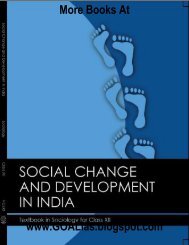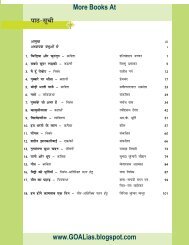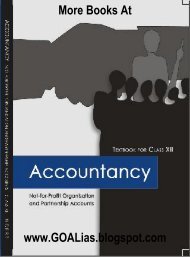- Page 1 and 2:
www.GOALias.blogspot.comMore Books
- Page 4:
www.GOALias.blogspot.comwww.GOALias
- Page 8:
www.GOALias.blogspot.comLetter to t
- Page 12:
www.GOALias.blogspot.comviiBalaji M
- Page 16:
www.GOALias.blogspot.comixTextbook
- Page 20:
www.GOALias.blogspot.comxiAcknowled
- Page 24:
www.GOALias.blogspot.comCredit: Sun
- Page 28:
www.GOALias.blogspot.com4 Politics
- Page 32:
www.GOALias.blogspot.com6 Politics
- Page 36:
www.GOALias.blogspot.com8 Politics
- Page 40:
www.GOALias.blogspot.com10 Politics
- Page 44:
www.GOALias.blogspot.com12Politics
- Page 48:
www.GOALias.blogspot.com14 Politics
- Page 52:
www.GOALias.blogspot.com16 Politics
- Page 56:
www.GOALias.blogspot.com18 Politics
- Page 60:
www.GOALias.blogspot.com20 Politics
- Page 64:
www.GOALias.blogspot.com22 Politics
- Page 70:
www.GOALias.blogspot.comChallenges
- Page 74:
www.GOALias.blogspot.comera of one-
- Page 78:
www.GOALias.blogspot.comEra of One-
- Page 82:
www.GOALias.blogspot.comEra of One-
- Page 86:
www.GOALias.blogspot.comEra of One-
- Page 90:
www.GOALias.blogspot.comEra of One-
- Page 94:
www.GOALias.blogspot.comEra of One-
- Page 98:
www.GOALias.blogspot.comEra of One-
- Page 102:
www.GOALias.blogspot.comEra of One-
- Page 106:
www.GOALias.blogspot.comEra of One-
- Page 110:
www.GOALias.blogspot.comEra of One-
- Page 114:
www.GOALias.blogspot.compolitics of
- Page 118:
www.GOALias.blogspot.comPolitics of
- Page 122:
www.GOALias.blogspot.comPolitics of
- Page 128:
www.GOALias.blogspot.com54 Politics
- Page 132:
www.GOALias.blogspot.com56 Politics
- Page 136:
www.GOALias.blogspot.com58 Politics
- Page 140:
www.GOALias.blogspot.com60 Politics
- Page 144:
www.GOALias.blogspot.com62 Politics
- Page 148:
www.GOALias.blogspot.comCredit: NMM
- Page 152:
www.GOALias.blogspot.com66 Politics
- Page 156:
www.GOALias.blogspot.com68 Politics
- Page 160:
www.GOALias.blogspot.com70Politics
- Page 164:
www.GOALias.blogspot.com72 Politics
- Page 168:
www.GOALias.blogspot.com74 Politics
- Page 172:
www.GOALias.blogspot.com76 Politics
- Page 176:
www.GOALias.blogspot.com78 Politics
- Page 180:
www.GOALias.blogspot.com80 Politics
- Page 184:
www.GOALias.blogspot.comCredit: R.
- Page 188:
www.GOALias.blogspot.com84 Politics
- Page 192:
www.GOALias.blogspot.com86 Politics
- Page 196:
www.GOALias.blogspot.com88 Politics
- Page 200: www.GOALias.blogspot.com90 Politics
- Page 204: www.GOALias.blogspot.com92 Politics
- Page 208: www.GOALias.blogspot.com94 Politics
- Page 212: www.GOALias.blogspot.com96 Politics
- Page 216: www.GOALias.blogspot.com98 Politics
- Page 220: www.GOALias.blogspot.com100 Politic
- Page 224: www.GOALias.blogspot.comThe editori
- Page 228: www.GOALias.blogspot.com104 Politic
- Page 232: www.GOALias.blogspot.com106 Politic
- Page 236: www.GOALias.blogspot.com108 Politic
- Page 240: www.GOALias.blogspot.com110 110 Pol
- Page 244: www.GOALias.blogspot.com112 Politic
- Page 248: www.GOALias.blogspot.com114 Politic
- Page 254: www.GOALias.blogspot.comThe Crisis
- Page 258: www.GOALias.blogspot.comThe Crisis
- Page 262: www.GOALias.blogspot.comThe Crisis
- Page 266: www.GOALias.blogspot.comThe Crisis
- Page 270: www.GOALias.blogspot.comThe Crisis
- Page 274: www.GOALias.blogspot.comThe Crisis
- Page 278: www.GOALias.blogspot.comrise of pop
- Page 282: www.GOALias.blogspot.comRise of Pop
- Page 286: www.GOALias.blogspot.comRise of Pop
- Page 290: www.GOALias.blogspot.comRise of Pop
- Page 294: www.GOALias.blogspot.comRise of Pop
- Page 298: www.GOALias.blogspot.comRise of Pop
- Page 302:
www.GOALias.blogspot.comRise of Pop
- Page 306:
www.GOALias.blogspot.comRise of Pop
- Page 310:
www.GOALias.blogspot.comRise of Pop
- Page 314:
www.GOALias.blogspot.comRise of Pop
- Page 318:
www.GOALias.blogspot.comregionalasp
- Page 322:
www.GOALias.blogspot.comRegional As
- Page 326:
www.GOALias.blogspot.comRegional As
- Page 330:
www.GOALias.blogspot.comRegional As
- Page 334:
www.GOALias.blogspot.comRegional As
- Page 338:
www.GOALias.blogspot.comRegional As
- Page 342:
www.GOALias.blogspot.comRegional As
- Page 346:
www.GOALias.blogspot.comRegional As
- Page 350:
www.GOALias.blogspot.comRegional As
- Page 354:
www.GOALias.blogspot.comRegional As
- Page 358:
www.GOALias.blogspot.comRegional As
- Page 362:
www.GOALias.blogspot.comRegional As
- Page 366:
www.GOALias.blogspot.comrecentdevel
- Page 370:
www.GOALias.blogspot.comRecent Deve
- Page 374:
www.GOALias.blogspot.comRecent Deve
- Page 378:
www.GOALias.blogspot.comRecent Deve
- Page 382:
www.GOALias.blogspot.comRecent Deve
- Page 386:
www.GOALias.blogspot.comRecent Deve
- Page 390:
www.GOALias.blogspot.comRecent Deve
- Page 394:
www.GOALias.blogspot.comRecent Deve
- Page 398:
www.GOALias.blogspot.comRecent Deve
- Page 402:
www.GOALias.blogspot.comRecent Deve
- Page 406:
www.GOALias.blogspot.comRecent Deve
- Page 410:
www.GOALias.blogspot.comNotes
















